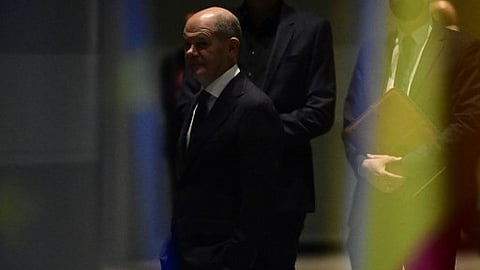
- NEWS
- the EDIT
- COMMENTARY
- BUSINESS
- LIFE
- SHOW
- ACTION
- GLOBAL GOALS
- SNAPS
- DYARYO TIRADA
- MORE

Berlin, Germany — German Chancellor Olaf Scholz’s first phone conversation with Russian President Vladimir Putin in nearly two years has sparked international reactions, underscoring the complexities of diplomacy amid the protracted Ukraine conflict.
The call on Friday, 15 November, was initiated by Germany and followed Scholz's earlier discussion with Ukrainian President Volodymyr Zelensky. The German leader assured Zelensky of continued consultations, stating he would also brief Ukraine after speaking with Putin. Scholz used the opportunity to condemn Russia's "war of aggression" and urged an immediate end to hostilities and the withdrawal of Russian troops.
A ‘frank exchange’ on Ukraine
The Kremlin described the discussion as a "detailed and frank exchange" on the situation in Ukraine. Putin reiterated Russia's stance that any agreement must reflect "new territorial realities" and address the root causes of the conflict. These remarks signal Moscow's insistence on maintaining control over territories annexed during the war, a position widely rejected by Kyiv and its Western allies.
Poland backs Scholz’s stance on Ukraine's involvement
Polish Prime Minister Donald Tusk voiced support for Scholz, highlighting his insistence that "nothing about Ukraine" could be decided without Kyiv's participation. "I was satisfied to hear that he not only condemned the Russian aggression but also reiterated the Polish position," Tusk said on social media.
Ukraine critical of Scholz-Putin dialogue
However, Ukraine reacted sharply to the call, labeling it an "attempt at appeasement." The Ukrainian foreign ministry argued that such engagements with Putin could ease his international isolation without advancing peace efforts. "Concrete, strong actions are needed to force him to peace, not persuasion and attempts at appeasement," the ministry stated.
A delicate balancing act
Scholz’s efforts reflect a delicate diplomatic balancing act. While Germany maintains robust support for Ukraine through military aid and sanctions on Russia, the chancellor's willingness to engage with Putin demonstrates an attempt to explore diplomatic channels.
This conversation also marks a significant shift since relations between Scholz and Putin soured following Russia’s invasion of Ukraine in February 2022. Whether such dialogues can yield meaningful progress remains uncertain, but they underline the persistent challenges in achieving peace in the region.
